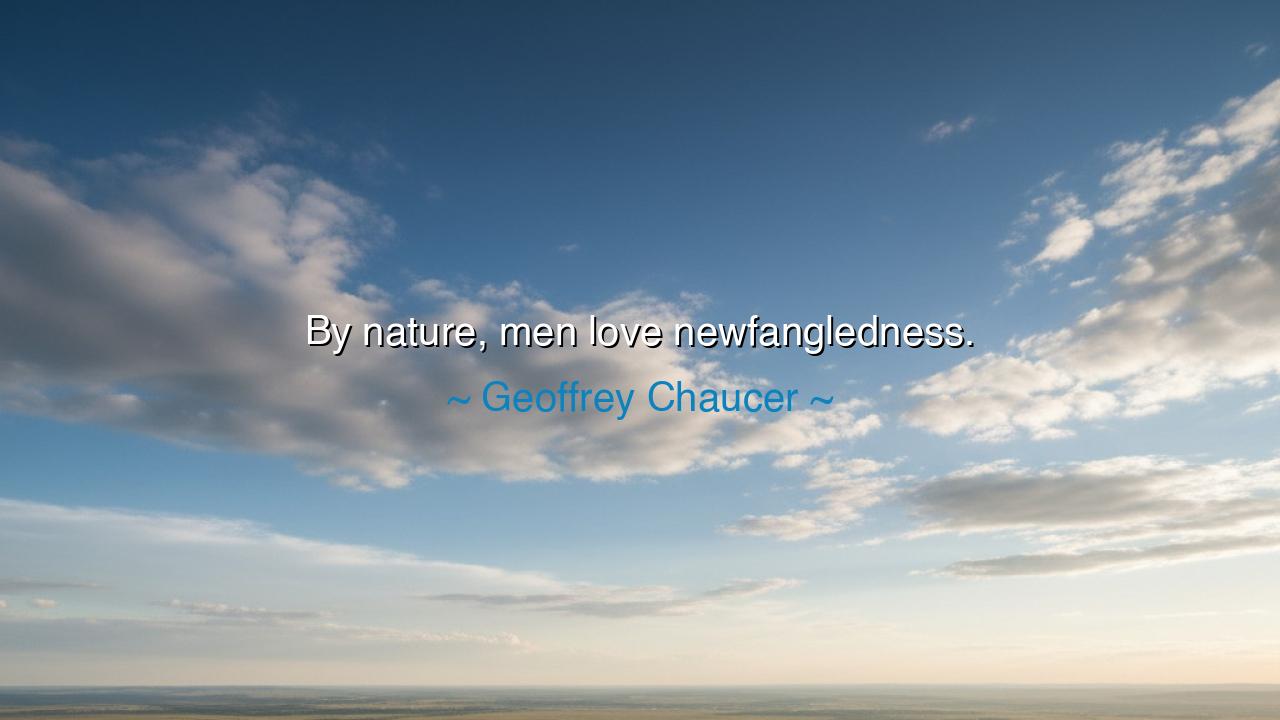
By nature, men love newfangledness.






Hear, O seekers of wisdom, the voice of Geoffrey Chaucer, father of English verse, who looked into the restless heart of man and proclaimed: “By nature, men love newfangledness.” This truth, though spoken in the Middle Ages, resounds through every age, for it reveals a constant hunger in the human spirit—the longing for the new, the untested, the unfamiliar. It is a force that draws men from their homes, stirs them to voyages, drives them to inventions, but also tempts them toward folly.
The meaning is layered. To love newfangledness is to be enthralled by novelty, to be enamored of what is fresh simply because it is different. It is a restless urge, born of curiosity and discontent, that makes man turn his face away from what is tried and proven in order to embrace the glittering promise of change. Chaucer, who watched the courts and common folk alike, knew that man’s heart is easily swayed by novelty, whether in fashion, in ideas, in lovers, or in power. The familiar may be faithful, but the new captures the imagination.
History is filled with examples of this. Consider the age of exploration, when sailors risked their lives upon uncharted seas, driven not only by need but by the love of discovery, of lands unseen. The world was changed forever because men were drawn to the newfangled idea that beyond the horizon lay riches and wonders. Yet this same love brought peril, for along with discovery came conquest, suffering, and the shattering of old worlds. The pursuit of novelty is both flame and shadow—it can enlighten or consume.
Or think of the story of the French Revolution. The people, weary of monarchy and hunger, turned with passion to newfangledness—to liberty, equality, fraternity. The old order was cast down, and in its place arose new visions of society. Yet, as Chaucer warned, novelty for its own sake can be dangerous. The Revolution, though it began with noble ideals, descended into terror when men sought change not with wisdom, but with blind devotion to the “new.” Thus, love of novelty must be tempered with judgment, lest it become destruction.
And yet, without this love of the new, mankind would stagnate. The great inventions, the soaring philosophies, the leaps of art and science—all spring from the restless drive to seek what has not yet been. It was this spirit that lifted man from caves to cathedrals, from parchment to printing press, from darkness to enlightenment. Chaucer did not condemn newfangledness, but revealed its double edge: it is both blessing and temptation, both gift and curse.
The lesson is thus: embrace novelty, but do not be enslaved by it. Seek out the new when it carries the seed of wisdom, but do not discard the old merely because it is familiar. Balance is the path of the wise—knowing when to honor tradition and when to embrace change. To chase endlessly after novelty is to live shallowly, always abandoning what one has for the promise of what might be. But to reject all novelty is to deny the spirit’s hunger to grow.
As for practical action, examine your desires carefully. Ask yourself: Do I love this thing because it is true, or simply because it is new? In your work, in your relationships, in your thoughts, do not be quick to discard the faithful for the fashionable. And yet, do not fear the new, for within it lies the potential for transformation. Let curiosity guide you, but let wisdom judge your steps. In this way, you may harness the fire of newfangledness without letting it consume you.
Thus, Chaucer’s words endure like a lantern across the centuries: “By nature, men love newfangledness.” Let us honor this truth not with blind indulgence, but with thoughtful embrace. For novelty, like fire, is a mighty servant but a cruel master. Let it warm and illuminate, but never let it burn away the enduring treasures of truth, loyalty, and wisdom.






AAdministratorAdministrator
Welcome, honored guests. Please leave a comment, we will respond soon